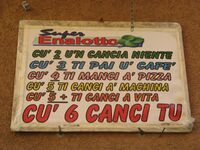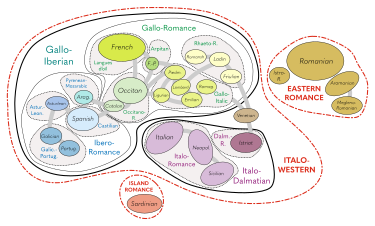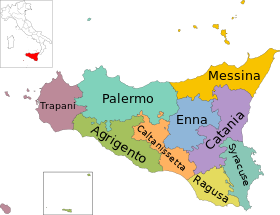صقلية (لغة)
| Sicilian | ||
|---|---|---|
| sicilianu | ||
| موطنها | Italy | |
| المنطقة | Sicily Calabria (parts) Apulia (Salento) Campania (Cilento) | |
| العرق | Sicilians, Italians | |
الناطقون الأصليون | 4.7 million (2002)e18 | |
| الوضع الرسمي | ||
لغة أقلية معترف بها في | ||
| أكواد اللغات | ||
| ISO 639-2 | scn | |
| ISO 639-2 | scn | |
| ISO 639-3 | scn | |
| Glottolog | sici1248 | |
| Linguasphere | 51-AAA-re & -rf
(mainland 51-AAA-rc & -rd) | |
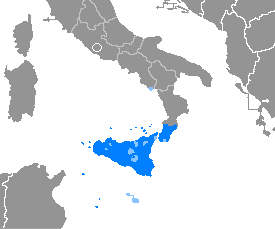 | ||
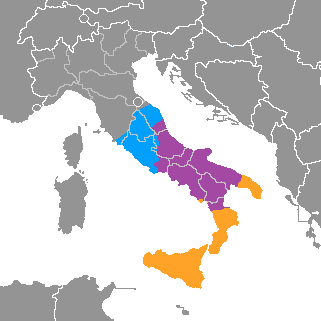 Sicilian as part of the Central-southern Italian linguistic area
Middle Italian Intermediate Southern Italian Extreme Southern Italian (Includes Sicilian)
| ||
اللغة الصقلية (صقلية: [sicilianu] Error: {{Lang}}: text has italic markup (help), تُنطق [sɪʃɪˈljaːnʊ]; إيطالية: siciliano) لغة رومانسية يتحدثها حوالي 5 ملايين شخص في صقلية وجنوب ايطاليا. اللغة ليست لغة رسمية في إيطاليا.[3] A variant, Calabro-Sicilian, is spoken in southern Calabria, where it is called Southern Calabro[3][4] notably in the Metropolitan City of Reggio Calabria.[5][6] Dialects of central and southern Calabria, the southern parts of Apulia (Salentino dialect) and southern Salerno in Campania (Cilentano dialect), on the Italian peninsula, are viewed by some linguists as forming with Sicilian dialects a broader Far Southern Italian language group (in Italian italiano meridionale estremo).[7]
Ethnologue (see below for more detail) describes Sicilian as being "distinct enough from Standard Italian to be considered a separate language",[3] and it is recognized as a minority language by UNESCO.[8][9][10][11] It has been referred to as a language by the Sicilian Region.[1] It has the oldest literary tradition of the modern Italian languages.[12][13] A version of the "UNESCO Courier" is also available in Sicilian.
Status
Sicilian is spoken by most inhabitants of Sicily and by emigrant populations around the world.[12] The latter are found in the countries that attracted large numbers of Sicilian immigrants during the course of the past century or so, especially the United States (specifically in the Gravesend and Bensonhurst neighborhoods of Brooklyn, New York City), Canada (especially in Montreal, Toronto and Hamilton), Australia, Venezuela and Argentina. During the last four or five decades, large numbers of Sicilians were also attracted to the industrial zones of Northern Italy and areas of the European Union, especially Germany.[14]
Although the Sicilian language does not have official status (including in Sicily),[بحاجة لمصدر] in addition to the standard Sicilian of the medieval Sicilian school, academics have developed a standardized form. Such efforts began in the mid-19th century when Vincenzo Mortillaro published a comprehensive Sicilian language dictionary intended to capture the language universally spoken across Sicily in a common orthography. Later in the century, Giuseppe Pitrè established a common grammar in his Grammatica Siciliana (1875). Although it presents a common grammar, it also provides detailed notes on how the sounds of Sicilian differ across dialects.[بحاجة لمصدر]
In the 20th century, researchers at the Centro di studi filologici e linguistici siciliani developed an extensive descriptivist orthography which aims to represent every sound in the natural range of Sicilian accurately.[15] This system is also used extensively in the Vocabolario siciliano and by Gaetano Cipolla in his Learn Sicilian series of textbooks[16] and by Arba Sicula in its journal.
In 2017, the nonprofit organisation Cademia Siciliana created an orthographic proposal to help to normalise the language's written form.[17][18][19]
The autonomous regional parliament of Sicily has legislated Regional Law No. 9/2011 to encourage the teaching of Sicilian at all schools, but inroads into the education system have been slow.[12][20] The CSFLS created a textbook "Dialektos" to comply with the law but does not provide an orthography to write the language.[21] In Sicily, it is taught only as part of dialectology courses, but outside Italy, Sicilian has been taught at the University of Pennsylvania, Brooklyn College and Manouba University. Since 2009, it has been taught at the Italian Charities of America, in New York City (home to the largest Sicilian speaking community outside of Sicily and Italy)[22][23] and it is also preserved and taught by family association, church organisations and societies, social and ethnic historical clubs and even Internet social groups, mainly in Gravesend and Bensonhurst, Brooklyn.[24][25][26] On 15 May 2018, the Sicilian Region once again mandated the teaching of Sicilian in schools and referred to it as a language, not a dialect, in official communication.[1]
The language is officially recognized in the municipal statutes of some Sicilian towns, such as Caltagirone[27] and Grammichele,[28] in which the "inalienable historical and cultural value of the Sicilian language" is proclaimed. Furthermore, the Sicilian language would be protected and promoted under the European Charter for Regional or Minority Languages (ECRML). Although Italy has signed the treaty, the Italian Parliament has not ratified it.[29] It is not included in Italian Law No. 482/1999 although some other minority languages of Sicily are.[30]
Ethnologue report
Phonology
| Labial | Dental/ Alveolar |
Palato- alveolar |
Palatal | Velar | |
|---|---|---|---|---|---|
| Stop | p b | t d | k ɡ | ||
| Affricate | ts dz | tʃ dʒ | |||
| Fricative | f v | s z | ʃ (ʒ) | ||
| Trill | r | ||||
| Flap | ɾ | ||||
| Nasal | m | n | ɲ | (ŋ) | |
| Approximant | l | j | (w) |
| Sicilian orthography | IPA | Sicilian example |
|---|---|---|
| ⟨a⟩ | /a/ | patri |
| ⟨e⟩ | /ɛ/ | bedda |
| ⟨i⟩ | /i/ | chiddu |
| ⟨o⟩ | /ɔ/ | sò |
| ⟨u⟩ | /u/ | tuttu |
Extract from Antonio Veneziano
Celia, Lib. 2
(ca. 1575–1580)
| Sicilian | Italian | English |
|---|---|---|
| Non è xhiamma ordinaria, no, la mia, | No, la mia non è fiamma ordinaria, | No, mine is no ordinary flame, |
| è xhiamma chi sul'iu tegnu e rizettu, | è una fiamma che sol'io possiedo e controllo, | it's a flame that only I possess and control, |
| xhiamma pura e celesti, ch'ardi 'n mia; | una fiamma pura e celeste che dientro di me cresce; | a pure celestial flame that in me grows; |
| per gran misteriu e cu stupendu effettu. | da un grande mistero e con stupendo effetto. | by a great mystery and with great effect. |
| Amuri, 'ntentu a fari idulatria, | l'Amore, desiderante d'adorare icone, | Love, wanting to worship idols, |
| s'ha novamenti sazerdoti elettu; | è diventato sacerdote un'altra volta; | has once again become a high priest; |
| tu, sculpita 'ntra st'alma, sìa la dia; | tu, scolpita dentro quest'anima, sei la dea; | you, sculpted in this soul, are the goddess; |
| sacrifiziu lu cori, ara stu pettu. | il mio cuore è la vittima, il mio seno è l'altare. | my heart is the victim, my breast is the altar.[32] |
Extract from Giovanni Meli
Don Chisciotti e Sanciu Panza (Cantu quintu)
(~1790)
| Sicilian | English |
|---|---|
| Stracanciatu di notti soli jiri; | Disguised he roams at night alone; |
| S'ammuccia ntra purtuni e cantuneri; | Hiding in any nook and cranny; |
| cu vacabunni ci mustra piaciri; | he enjoys the company of vagabonds; |
| poi lu so sbiu sunnu li sumeri, | however, donkeys are his real diversion, |
| li pruteggi e li pigghia a ben vuliri, | he protects them and looks after all their needs, |
| li tratta pri parenti e amici veri; | treating them as real family and friends; |
| siccomu ancora è n'amicu viraci | since he remains a true friend |
| di li bizzarri, capricciusi e audaci. | of all who are bizarre, capricious and bold.[33] |
Extract from Nino Martoglio
Briscula 'n Cumpagni
(~1900; trans: A game of Briscula amongst friends)[34]
| Sicilian | Italian | English |
|---|---|---|
| — Càrricu, mancu? Cca cc'è 'n sei di spati!... | — Nemmeno un carico? Qui c'è un sei di spade!... | — A high card perhaps? Here's the six of spades!... |
| — E chi schifiu è, di sta manera? | — Ma che schifo, in questo modo? | — What is this rubbish you're playing? |
| Don Peppi Nnappa, d'accussì jucati? | Signor Peppe Nappa,[أ] ma giocate così? | Mr. Peppe Nappa, who taught you to play this game? |
| — Massari e scecchi tutta 'a tistera, | — Messere e asino con tutti i finimenti, | — My dear gentlemen and donkeys with all your finery, |
| comu vi l'haju a diri, a vastunati, | come ve lo devo dire, forse a bastonate, | as I have repeatedly told you till I'm blue in the face, |
| ca mancu haju sali di salera! | che non ho nemmeno il sale per la saliera! | I ain't got nothing that's even worth a pinch a salt! |
Traditional prayers compared to Italian
| Patri nostru (Lord's Prayer in Sicilian) | Padre nostro (Lord's Prayer in Italian) | Aviu Maria (Hail Mary in Sicilian) | Ave Maria (Hail Mary in Italian) | Salvi o'Rigina (Salve Regina in Sicilian) | Salve Regina (in Italian) | Angelu ca ni custudisci (Angel of God in Sicilian) | Angelo Custode (Angel of God in Italian) |
|---|---|---|---|---|---|---|---|
|
|
|
|
|
|
|
|
Influence on Italian
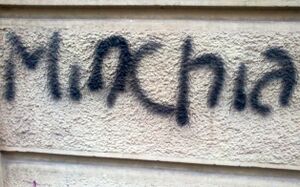
As one of the most spoken languages of Italy, Sicilian has notably influenced the Italian lexicon. In fact, there are several Sicilian words that are now part of the Italian language and usually refer to things closely associated to Sicilian culture, with some notable exceptions:[35]
- arancino (from arancinu): a Sicilian cuisine specialty;
- canestrato (from ncannistratu): a cheese typical of Sicily;
- cannolo (from cannolu): a Sicilian pastry;
- cannolicchio (from cannulicchiu): razor clam;
- carnezzeria (from carnizzaria): butcher's shop;
- caruso (from carusu): boy, especially a Sicilian one;
- cassata: a Sicilian pastry;
- cirneco (from cirnecu): a small breed of dogs common in Sicily;
- cosca: a small group of criminals affiliated to the Sicilian mafia;
- curatolo (from curàtulu): watchman in a farm, with a yearly contract;
- dammuso (from dammusu): stony habitation typical of the island of Pantelleria;
- intrallazzo (from ntrallazzu): illegal exchange of goods or favours, but in a wider sense also cheat, intrigue;
- marranzano (from marranzanu): Jew's harp;
- marrobbio (from marrubbiu): quick variation of sea level produced by a store of water in the coasts as a consequence of either wind action or an atmospheric depression;
- minchia: penis in its original meaning, but also stupid person; is also widely used as interjection to show either astonishment or rage;
- picciotto (from picciottu): young man, but also the lowest grade in the Mafia hierarchy;
- pizzino (from pizzinu): small piece of paper, especially used for secret criminal communications;
- pizzo (from pizzu, literally meaning "beak", from the saying fari vagnari a pizzu "to wet one's beak"): protection money paid to the Mafia;
- quaquaraquà (onomatopoeia?; "the duck wants a say"): person devoid of value, nonentity;
- scasare (from scasari, literally "to move home"): to leave en masse;
- stidda (equivalent to Italian stella): lower Mafia organization.
Sample words and phrases
| English | Sicilian | Pronunciation |
|---|---|---|
| to make a good impression | fà[ci]ri na beḍḍa fi[g]ùra | [ˈfaː(ʃɪ)ɾɪ na bˈbɛɖːa fɪˈ(ɡ)uːɾa] |
| wine | vinu | [ˈviːnʊ] |
| man | masculu | |
| woman | fìmmina | [ˈfimmɪna] |
| the other side | ḍḍabbanna | [ɖːa bˈbanna] |
| also, too | mirè | |
| there | ḍḍa | [ɖːa] |
| right there | ḍḍocu | [ˈɖːɔːkʊ] |
| where | unni | [ˈunnɪ] |
| you (formal) | vossìa | [vɔsˈsiːa] |
| be careful! | accura! | [akˈkuːɾa] |
| he, him | iḍḍu | [ˈiɖːʊ] |
| she, her | iḍḍa | [ˈiɖːa] |
| once, formerly | tannu | [ˈtanːu] |
| he who pays before seeing the goods gets cheated (literally "who pays before, eats smelly fish") |
cu paja prima, mancia li pisci fitùsi | [ˌku ˈpaːja ˈpɾiːma ˈmantʃa lɪ ˈpiʃʃɪ fɪˈtuːsɪ] |
انظر أيضاً
- Sicilian School
- Siculo-Arabic
- Centro di studi filologici e linguistici siciliani
- Arba Sicula
- Cademia Siciliana
- Magna Graecia
- Griko
- Theme of Sicily
ملاحظات
- ^ Peppe Nappa is a character of the Commedia dell'arte, similar to Pulcinella o Arlecchino.
المراجع
- ^ أ ب ت "Iniziative per la promozione e valorizzazione della lingua Siciliana e l'insegnamento della storia della Sicilia nelle scuole di ogni ordine e grado della Regione" [Initiatives for the promotion and development of Sicilian language in the schools of all type and degree of the Region]. resolutionofError: the
dateoryearparameters are either empty or in an invalid format, please use a valid year foryear, and use DMY, MDY, MY, or Y date formats fordate(PDF) (in الإيطالية). Retrieved July 17, 2018. - ^ "Consiglio Regionale della Calabria" (PDF).
- ^ أ ب ت "Sicilian entry in Ethnologue". www.ethnologue.com. Retrieved 27 Dec 2017.
(20th ed. 2017)
- ^ Rohlfs, Gerhard (1972). Studi su lingua e dialetti d'Italia [Studies on the language and dialects of Italy] (in الإيطالية). Florence: Sansoni.
- ^ Varvaro, Alberto (1988). "Sizilien". Italienisch, Korsisch, Sardisch [Italian, Corsican, Sardinian] (in الألمانية). Tübingen: Max Niemeyer Verlag.
- ^ Devoto, Giacomo; Giacomelli, Gabriella (1972). I dialetti delle regioni d'Italia [Dialects of the regions of Italy] (in الإيطالية). Florence: Sansoni. p. 143.
- ^ Avolio, Francesco (2012). Lingue e dialetti d'Italia [Languages and dialects of Italy] (in الإيطالية) (2nd ed.). Rome: Carocci. p. 54.
- ^ Wei, Li; Dewaele, Jean-Marc; Housen, Alex (2002). Opportunities and Challenges of Bilingualism (in الإنجليزية). Walter de Gruyter. ISBN 9783110852004.
- ^ Facaros, Dana; Pauls, Michael (2008). Sicily (in الإنجليزية). New Holland Publishers. ISBN 9781860113970.
- ^ "UNESCO Atlas of the World's Languages in danger". www.unesco.org. Retrieved August 16, 2016.
- ^ "Lingue riconosciute dall'UNESCO e non tutelate dalla 482/99". Piacenza: Associazion Linguìstica Padaneisa. Archived from the original on 2016-03-04.
- ^ أ ب ت Cipolla 2004.
- ^ Sammartino, Peter; Roberts, William (2001-01-01). Sicily: An Informal History (in الإنجليزية). Associated University Presses. ISBN 9780845348772.
- ^ Salerno, Vincenzo. "Diaspora Sicilians Outside Italy". www.bestofsicily.com. Retrieved December 27, 2017.
- ^ Piccitto, Giorgio (1997). Vocabolario siciliano (in الإيطالية). Centro di studi filologici e linguistici siciliani, Opera del Vocabolario siciliano.
- ^ Cipolla, Gaetano (2013). Learn Sicilian. Legas. ISBN 978-1-881901-89-1.
- ^ "LINGUA SICILIANA / Da Firefox in Siciliano alla proposta di Norma Ortografica, vi raccontiamo la Cademia Siciliana". Identità Insorgenti (in الإيطالية). Retrieved December 20, 2017.
- ^ "Orthography Standardisation - Cademia Siciliana". Cademia Siciliana (in الإنجليزية الأمريكية). Retrieved December 20, 2017.
- ^ "L'Accademia che studia il siciliano: "È ancora chiamato dialetto, ma ha un valore immenso"". Liveunict (in الإيطالية). University of Catania. December 6, 2017. Retrieved December 12, 2017.
- ^ "Centro di studi filologici e linguistici siciliani » Legge Regionale 31 maggio 2011, N. 9". www.csfls.it (in الإيطالية). Retrieved December 14, 2017.
- ^ "Home". www.dialektos.it (in الإيطالية). Retrieved December 20, 2017.
- ^ "Sicilian Language and Culture | LPS Course Guide". www.sas.upenn.edu (in الإنجليزية). Retrieved December 20, 2017.
- ^ "La langue de Pirandello bientôt enseignée". La presse de Tunisie (in الفرنسية). Retrieved December 20, 2017.
- ^ "Sicilian American Club". www.yahoo.com.
- ^ "Sicilian Americans - History, Modern era, The first sicilians in america". everyculture.com.
- ^ "Welcome to the National Sicilian American Foundation". National National Sicilian American Foundation. Archived from the original on January 4, 2015. Retrieved January 2, 2017.
- ^ Arcadipane, Michele. "Gazzetta Ufficiale della Regione Siciliana: Statuto del Comune di Caltagirone" (in الإيطالية). Legislative and legal office of Regione Sicilia.
- ^ Arcadipane, Michele. "Gazzetta Ufficiale della Regione Siciliana: Statuto del Comune di Grammichele" (in الإيطالية). Legislative and legal office of Regione Sicilia.
- ^ Cardi, Valeria (December 12, 2007). "Italy moves closer to ratification of the European Charter for Regional or Minority Languages". Eurolang. Archived from the original on December 12, 2007.
- ^ "Legge 482". ActofError: the
dateoryearparameters are either empty or in an invalid format, please use a valid year foryear, and use DMY, MDY, MY, or Y date formats fordate. - ^ Privitera, Joseph Frederic (1998). Basic Sicilian : a brief reference grammar. Lewiston, N.Y.: Edwin Mellen Press. ISBN 0773483357. OCLC 39051820.
- ^ Arba Sicula 1980.
- ^ Meli 1995.
- ^ Martoglio 1993.
- ^ Zingarelli 2006.
ببليوجرافيا
- Abulafia, David, The end of Muslim Sicily
- Alio, Jacqueline (2018), Sicilian Studies: A Guide and Syllabus for Educators, Trinacria, ISBN 978-1943-63918-2
- (in en,scn)Arba Sicula, II, 1980
- Bonner, J. K. "Kirk" (2001), Introduction to Sicilian Grammar, Ottawa: Legas, ISBN 1-881901-41-6
- Camilleri, Salvatore (1998), Vocabolario Italiano Siciliano, Catania: Edizioni Greco
- Piccitto, Giorgio (2002) (in it,scn), Vocabolario Siciliano, Catania-Palermo: Centro di Studi Filologici e Linguistici Siciliani (the orthography used in this article is substantially based on the Piccitto volumes)
- Cipolla, Gaetano (2004), "U sicilianu è na lingua o un dialettu? / Is Sicilian a Language?" (in en,scn), Arba Sicula XXV (1&2)
- Cipolla, Gaetano (2005), The Sound of Sicilian: A Pronunciation Guide, Ottawa: Legas, ISBN 978-1-881901-51-8, https://books.google.com/books?id=ssY2nwEACAAJ
- Giarrizzo, Salvatore (1989) (in it), Dizionario etimologico siciliano, Palermo: Herbita, https://books.google.com/books?id=4a0dAQAAIAAJ
- Hughes, Robert (2011), Barcelona, Knopf Doubleday Publishing Group, ISBN 978-0-307-76461-4, https://books.google.com/books?id=mgKonzUWye8C
- Hull, Geoffrey (2001), Polyglot Italy: Languages, Dialects, Peoples, Ottawa: Legas, ISBN 0-949919-61-6
- Martoglio, Nino (1993), Cipolla, Gaetano, ed. (in en,scn), The Poetry of Nino Martoglio, Ottawa: Legas, ISBN 1-881901-03-3
- Meli, Giovanni (1995) (in en,scn), Moral Fables and Other Poems: A Bilingual (Sicilian/English) Anthology, Ottawa: Legas, ISBN 978-1-881901-07-5, https://books.google.com/books?id=nU_XAAAAMAAJ
- Mendola, Louis (2015), Sicily's Rebellion against King Charles: The story of the Sicilian Vespers, New York City, ISBN 9781943639038
- Nef, Annliese (2003), "Géographie religieuse et continuité temporelle dans la Sicile normande (XIe-XIIe siècles): le cas des évêchés", written at Madrid, in Henriet, Patrick (in fr), À la recherche de légitimités chrétiennes – Représentations de l'espace et du temps dans l'Espagne médiévale (IXe-XIIIe siècles), Lyon
- Norwich, John Julius (1992), The Kingdom in the Sun, London: Penguin Books, ISBN 1-881901-41-6
- Pitrè, Giuseppe (2002) (in it), Grammatica siciliana: un saggio completo del dialetto e delle parlate siciliane : in appendice approfondimenti letterari, Brancato, ISBN 9788880315049, https://books.google.com/books?id=KrodAQAAIAAJ
- Privitera, Joseph (2001), "I Nurmanni in Sicilia Pt II / The Normans in Sicily Pt II" (in en,scn), Arba Sicula XXII (1&2): 148–157
- Privitera, Joseph Frederic (2004), Sicilian: The Oldest Romance Language, Ottawa: Legas, ISBN 978-1-881901-41-9, https://books.google.com/books?id=UMbjAAAAMAAJ
- Ruffino, Giovanni (2001) (in it), Sicilia, Bari: Laterza, ISBN 88-421-0582-1
- Runciman, Steven (1958), The Sicilian Vespers, Cambridge: Cambridge University Press, ISBN 0-521-43774-1
- Zingarelli, Nicola (2006) (in it), Lo Zingarelli 2007. Vocabolario della lingua italiana. Con CD-ROM, Zanichelli, ISBN 88-08-04229-4
External links
- Arba Sicula - a non-profit organization that promotes the language and culture of Sicily
- Napizia - Dictionary of the Sicilian Language
- Sicilian Translator
- (in صقلية) www.linguasiciliana.org
- siciliangestures.net: Sicilian body language, learn the meaning of 81 gestures of Sicily with an app (free and no ads)
- CS1 الإيطالية-language sources (it)
- CS1 الألمانية-language sources (de)
- CS1 الإنجليزية الأمريكية-language sources (en-us)
- CS1 الفرنسية-language sources (fr)
- Short description is different from Wikidata
- Articles with hatnote templates targeting a nonexistent page
- Articles containing صقلية-language text
- Languages with ISO 639-2 code
- Lang and lang-xx template errors
- Pages with plain IPA
- Articles containing إيطالية-language text
- Pages using Lang-xx templates
- مقالات ذات عبارات بحاجة لمصادر
- Pages with empty portal template
- Articles with صقلية-language sources (scn)
- Sicilian language
- Italo-Dalmatian languages
- Languages of Sicily
- Languages of Calabria
- Languages of Apulia
- Subject–object–verb languages
- مقالات تحتوي مقاطع ڤيديو
- لغات رومانسية
- لغات ايطاليا
